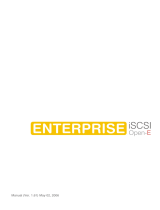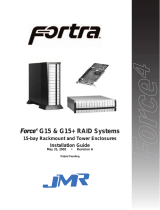
● 4
Software License Agreement
PLEASE READ CAREFULLY: THE USE OF THIS SOFTWARE IS SUBJECT TO THE SOFTWARE LICENSE TERMS OF ICP
VORTEX AND OTHER LICENSORS WHOSE SOFTWARE MAY BE BUNDLED WITH THIS PRODUCT.
BY YOUR USE OF THE SOFTWARE INCLUDED WITH THIS PRODUCT YOU AGREE TO THE LICENSE TERMS REQUIRED
BY THE LICENSOR OF THAT SOFTWARE, AS SET FORTH DURING THE INSTALLATION PROCESS. IF YOU DO NOT
AGREE TO THE LICENSE TERMS APPLICABLE TO THE SOFTWARE, YOU MAY RETURN THE ENTIRE UNUSED PRODUCT
FOR A FULL REFUND
.
In return for acquiring a license to use the ICP vortex software (“Software”) and the related documentation, you agree to the
following terms and conditions:
1. License. This Agreement grants you, the Licensee, a license to:
●
Use the Software on a single computer system or on multiple workstations, systems and servers which incorporate an ICP vortex
RAID controller and may be accessed by multiple users from multiple locations. You may make as many installations of the Soft-
ware as needed, but must restrict such installation only to systems, workstations or servers using an ICP vortex RAID controller.
● Make one copy of the Software in machine readable form solely for back-up purposes provided you reproduce ICP vortex’s
copyright notice and any proprietary legends.
2. Restrictions. You may not distribute copies of the Software to others. You may not post or otherwise make available the
Software, or any portion thereof, in any form, on the Internet. You may not use the Software in a computer service business,
including in time sharing applications. The Software contains trade secrets and, in order to protect them, you may not
decompile, reverse engineer, disassemble, or otherwise reduce the Software to a human-perceivable form. YOU MAY NOT
MODIFY, ADAPT, TRANSLATE, RENT, LEASE, LOAN, RESELL FOR PROFIT, DISTRIBUTE, NETWORK OR CREATE
DERIVATIVE WORKS BASED UPON THE SOFTWARE OR ANY PART THEREOF.
3.
Ownership of Software. As Licensee, you own the media upon which the software is recorded or fixed, but ICP vortex and its
licensors retain title and ownership of the Software recorded on the original media and all subsequent copies of the Software,
regardless of the form or media in which or on which the original and other copies may exist. This license is not a sale of the
Software or any copy
.
4. Confidentiality. You agree to maintain the Software in confidence and that you will not disclose the Software to any third party
without the express written consent of ICP vortex. You further agree to take all reasonable precautions to preclude access of
unauthorized persons to the Software.
5. Term. This license is effective until January 1, 2045, unless terminated earlier. You may terminate the license at any time by
destroying the Software (including the related documentation) together with all copies or modifications in any form. ICP vortex
will have the right to terminate our license immediately if you fail to comply with any term or condition of this Agreement.
Upon any termination, including termination by you, you must destroy the Software (including the related documentation),
together with all copies or modifications in any form.
6. Special Terms Applicable to Databases. Where a database is included with the Software, you acknowledge that it is licensed only
in connection with the use of the Software to perform disc creation, and that the database and all data derived therefrom must
be maintained in confidence in accordance with the provisions of Section 4. This license does not grant you any rights to
distribute or disclose such database or data.
7. Limited Warranty. ICP vortex and its Licensor warrant only that the media upon which the Software is furnished will be free
from defects in material or workmanship under normal use and service for a period of thirty (30) days from the date of delivery
to you. ICP VORTEX AND ITS LICENSORS DO NOT AND CANNOT WARRANT THE PERFORMANCE OR RESULTS YOU
MAY OBTAIN BY USING THE SOFTWARE OR DOCUMENTATION. THE FOREGOING STATES THE SOLE AND
EXCLUSIVE REMEDIES ICP VORTEX AND ITS LICENSORS WILL PROVIDE FOR BREACH OF WARRANTY. EXCEPT
FOR THE FOREGOING LIMITED WARRANTY, ICP VORTEX AND ITS LICENSORS MAKE NO WARRANTIES,
EXPRESSED OR IMPLIED, INCLUDING, BUT NOT LIMITED, AS TO NON-INFRINGEMENT OF THIRD PARTY RIGHTS,
MERCHANTABILITY OR FITNESS FOR A PARTICULAR PURPOSE. Some states do not allow the exclusion of implied
warranties or limitations on how long an implied warranty may last, so the above limitations may not apply to you. This
warranty gives you specific legal rights and you may also have other rights which vary from state to state.
8. The entire liability of ICP vortex and its licensors, and your exclusive remedy for a breach of this warranty, shall be:
● The replacement of any media not meeting the above limited warranty which is returned to ICP vortex; or:
● If ICP vortex or its distributor is unable to deliver replacement media which is free from defects in materials or workman-
ship, you may terminate this Agreement by returning the Software and your money will be refunded.
9. Limitation of Liability. IN NO EVENT WILL ICP VORTEX OR ITS LICENSORS BE LIABLE TO YOU FOR ANY
INCIDENTAL, CONSEQUENTIAL OR INDIRECT DAMAGES, INCLUDING ANY LOST PROFITS, LOST SAVINGS, OR
LOSS OF DATA, EVEN IF ICP VORTEX OR A LICENSOR HAS BEEN ADVISED OF THE POSSIBILITY OF SUCH
DAMAGES, OR FOR ANY CLAIM BY ANY OTHER PARTY. Some states do not allow the exclusion or limitation of special,
incidental, or consequential damages, so the above limitation or exclusion may not apply to you.






















